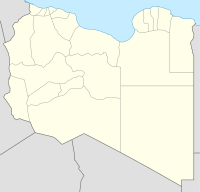| Siege of Giarabub | |||||||
|---|---|---|---|---|---|---|---|
| Part of the Western Desert campaign of the Second World War | |||||||
| |||||||
| Belligerents | |||||||
|
|
| ||||||
| Commanders and leaders | |||||||
|
|
| ||||||
| Strength | |||||||
|
2 mechanised cavalry squadrons 1 augmented infantry battalion | 2,100 (1,350 Italian & 750 Libyan troops) | ||||||
| Casualties and losses | |||||||
| 17 killed, 77 wounded (final assault only) |
250 killed 1,300 prisoners[a] 26 field guns | ||||||
Giarabub, Libya | |||||||
The siege of Giarabub (now Jaghbub) in Libya, was an engagement between Commonwealth and Italian forces, during the Western Desert Campaign of the Second World War. In the aftermath of Operazione E, the invasion of Egypt by the Italian 10th Army (9–16 September 1940), Operation Compass (9–16 December) by the Western Desert Force (WDF), the Battle of Sidi Barrani and the pursuit of the 10th Army into Cyrenaica (16 December 1940 – 9 February 1941) the fortified Italian position at the Al Jaghbub Oasis was besieged by parts of the 6th Australian Division.
The 6th Australian Divisional Cavalry Regiment (6th ADCR) began the siege in December 1940 and isolated the oasis, leaving the Italian garrison dependent on the Regia Aeronautica. Air transport proved insufficient and hunger prompted many of the locally recruited troops to desert. After being reinforced by the 2/9th Australian Battalion and a battery of the 4th Royal Horse Artillery, the Australians attacked Giarabub on 17 March 1941 and the Italian garrison surrendered on 21 March.
Cite error: There are <ref group=lower-alpha> tags or {{efn}} templates on this page, but the references will not show without a {{reflist|group=lower-alpha}} template or {{notelist}} template (see the help page).
